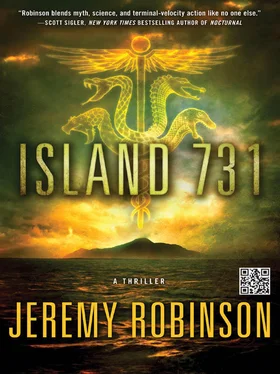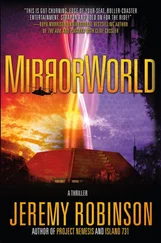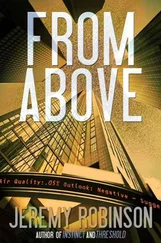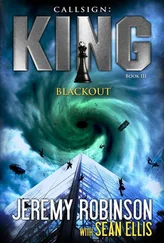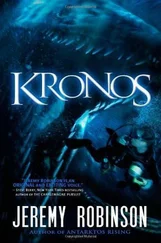“What was that?” DeWinter blurted, fear filling her voice.
“Could be Kam,” Joliet said quickly, and before anyone could offer another possibility, she was off and running across the cluttered deck.
“Joliet!” Hawkins shouted as he gave chase. “Slow down!” But he could see she had no intention of slowing down. She’d jumped into shark-infested waters to save an already dead turtle. He had no doubt she’d jump in now to save Kam. But they didn’t even know if it was Kam. It could be the shark tearing apart Cahill’s body. It could be any number of things that wouldn’t be wise to dive-bomb.
Halfway across the debris-strewn deck, Hawkins could see that Joliet wasn’t going to slow down. Ignoring the mess, he risked not watching his step and sprinted forward. Look before you leap , Hawkins thought. The old catchphrase had become cliché over time, but no less effective at saving lives.
But Joliet seemed unfamiliar with the phrase. She leapt up, planting her right foot on the rail, and bent her legs, ready to spring out into the air. As her leg extended, Hawkins reached an arm around her waist. When she pushed, he pulled.
For a moment, Hawkins thought she might take them both overboard, but Joliet’s one hundred twenty pounds were no match for Hawkins’s two hundred. Still, the effort it took to pull her back sent them both sprawling to the deck, where she began kicking to get free.
“What the hell!” she shouted. “Hawkins, let me go!”
“Calm down,” Hawkins said, and then grunted as he caught an elbow in the gut. He understood the emotions driving her—it could be Kam, and to Joliet, not jumping in meant she was abandoning their friend. Hawkins felt similarly, but the splash could have been made by whatever had taken Cahill, and one close encounter with a predator in any given month was more than enough. If it had been Joliet who was missing, Hawkins might have jumped in himself. As he fought with her, he recognized the strong emotions fueling his fight to keep her on board, and safe. He was hooked like a tuna and she was reeling him steadily in. Of course, she might not talk to him after this. “You need to start thinking things through.”
As they struggled, Jones stepped past them and looked over the rail.
“Mark, I swear to God, if you don’t let me go—”
“Nothing down there,” Jones said.
The struggle stopped.
“Would have jumped in for nothing,” the engineer added. “You should listen to your man.”
Hawkins let go of Joliet. She stood up, gave Hawkins a kick in the leg, and turned on Jones. “He’s not my man.” She stepped up to the rail and looked over the side.
Jones helped Hawkins to his feet, and gave him a nod. “You did good, son. She’ll thank you later.”
Hawkins looked at Joliet. “We’ll see about that.”
When he stepped up to the rail, Joliet was back to business, scouring the water. Hawkins saw nothing, but a few random chunks of flotsam. “There’s nothing down there.”
He was about to follow up his observation by pointing out that she would have jumped in for nothing, but she pointed toward shore and said, “But something was.”
Rings of water rippled across the lagoon. But they weren’t just moving away from the Magellan , they were also moving toward it. “Whatever it was that made that splash, it didn’t fall from the ship. It was closer to shore.”
“It wasn’t Kam,” she said.
Hawkins scoured the scene with his eyes, looking for some sign of what had been in the water. But like most everything in the ocean, whatever made the splash had left no other trace, save for a few ripples on the surface. That’s when he turned his eyes to the sandy shore and saw something he recognized without any trouble.
“Footprints,” he said. “On shore.”
“Where?” Joliet asked. “I don’t see anything.”
Hawkins pointed toward the prints, but knew she wouldn’t see them. They were indistinct and masked by the glare of the white sand in the bright sun. But he knew footprints when he saw them.
“Here,” Jones said, tapping Hawkins on the shoulder.
Hawkins turned to find a small pair of binoculars in Jones’s hands.
“Like to watch for whales in my free time,” Jones explained.
The binoculars weren’t very powerful, but they worked well enough to reveal the details on the beach. The footprints were more like toeprints. Whoever had made them was both barefoot, and running. They emerged from water, turned a hard run, cutting a line parallel to the water, and then into the jungle. “Someone was in the water,” he said. “Whoever it was exited the lagoon in a hurry, then moved along the beach.”
“I knew it was Kam,” Joliet said and then snatched the binoculars from Hawkins’s hands. She searched the beach for herself and lowered the binoculars. “You should have let me go.”
Hawkins’s patience began to wear thin. “Whoever was in the water—”
“Kam,” she said.
“ Whoever . He was gone before you got to the rail. If— if —you managed to cross the lagoon without being eaten by whatever took Cahill’s body, you wouldn’t be able to track them in this jungle. It’s too thick.”
“And you could?”
Hawkins could see Joliet was responding out of frustration. She liked Kam a lot and was clearly concerned. He was, too. But her knee-jerk reaction would put herself in danger and, if she went tromping through the jungle in hot pursuit, was likely to wipe out any trail left behind. “Yes, Avril. It’s what I do.”
That sunk in slowly. Joliet’s tense shoulders relaxed. “Sorry.”
Hawkins thought about his time as a park ranger. He’d loved the job. The outdoors. The scenery. The pay was shit, but the life; it was good. Most of the time. But sometimes people got lost. Or attacked. And when that happened it was Hawkins’s job to find them. He had an almost unnatural ability to find missing people, though he knew it was simply a result of having the best teacher.
Hawkins grew up in Durango, Colorado, right on the border of the Southern Ute Indian Reservation: 1,058 square miles of protected land, if you ignored the Sky Ute Casino and Resort. Hawkins’s love of nature brought him to the reservation to hike and explore and, after meeting them on a trail, he became friends with Jimmy GoodTracks and his father, Howie, who took the boys hunting whenever possible. Hawkins’s mother had died in childbirth and his father, who never forgave him for it, was a drunk. So Hawkins spent as much time with the GoodTracks as he could.
Tragedy struck a year into their friendship when Jimmy was hit and killed by a truck, whose driver had fallen asleep at the wheel. Not long after Jimmy’s death, Hawkins’s father up and left. For good. Sharing a mutual grief, Hawkins and Howie GoodTracks adopted each other. While the adoption wasn’t legal, he had no living grandparent or relatives who cared, so no one came calling. They became the father and son both had lost.
The GoodTracks name came about on account of Howie’s ancestors being expert trackers. Tribe legend said that they could find a man lost in the mountains blindfolded, tracking by scent and sound alone. Howie spent the next six years teaching Hawkins everything he knew. By the time Hawkins went to college, he could follow a trail that was invisible for most people.
“Your name is fitting,” GoodTracks had said after Hawkins followed a three-week-old trail that had been windswept and rained on to find a feather hidden beneath a stone—a final test. “You see like a hawk.”
Hawkins had never been more proud. When he finished college with a degree in conservation and a minor in English, he decided to carry on the GoodTracks legacy by becoming a park ranger specializing in rescue and recovery. And no one was better.
Читать дальше
